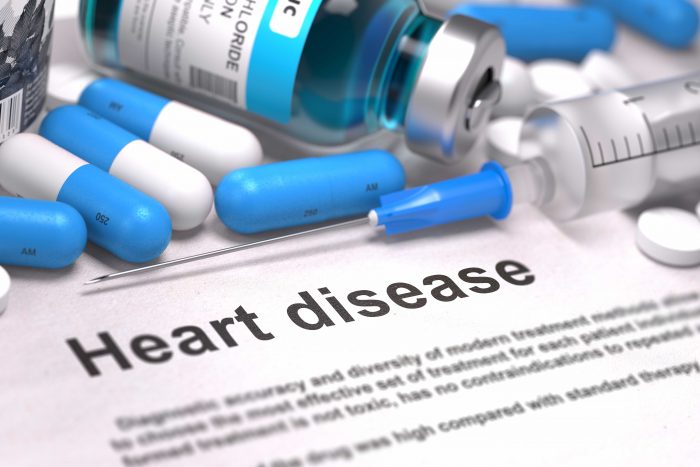Heart Disease Risk Factors

Heart Disease Risk Factors
To me, one of the most precious forms of intimacy is hearing your partner’s heartbeat. The rhythmic pumping of the heart is like the sound of the song of life itself. Tuning in to the song your partner’s heart sings can spark a unique affinity. Feeling and hearing the heart working to support life is remarkably comforting. With each pump, your heart sends blood throughout your body, which supplies nutrients and oxygen as needed, and carries away waste.
Though you can’t always hear the heart at work, don’t overlook your heart’s health. The American Heart Association states that more than one-third of women have a form of cardiovascular disease and that the leading cause of hospital visits for men in the U.S. is heart disease.
The chances of developing heart disease are a direct result of your daily lifestyle choices, as well as your genetic makeup. Knowing the risk factors to develop heart disease is the first step to making changes for prevention. Mayo Clinic provides a list of risk factors.
- Genetics. As you age, your arteries may become damaged, which increases your risk. Men are generally more susceptible to heart disease, and the risk for women increases following menopause. Having a family history of heart disease increases your chances, as well. It’s also possible to be born with a heart defect without symptoms showing up until later on in life.
- Poor diet. Having everything in moderation is key. A diet that consists of too much cholesterol, sugar, salt, and fat can have consequences on your heart health.
- Having high cholesterol increases plaque formation in your blood. High blood pressure thickens your arteries and narrows the vessels that your blood travels through. Not maintaining your cholesterol and blood pressure levels increases your risk of heart disease.
- Smokers have a higher chance of a heart attack than nonsmokers. Nicotine constricts blood vessels, while the carbon monoxide damages the inner lining.
- Physical inactivity. Your heart is a muscle that needs to be exercised to maintain its health.
- Stress can actually increase your chance of heart disease by damaging your arteries. Anxiety disorders can increase your chance of heart disease.
Knowing which risks make you susceptible to heart disease, what kind of lifestyle changes can you make to support a healthier heart? Decrease your sugar, fat, salt, and cholesterol intake, and replace these things with heart-healthy foods–such as leafy greens, beans, and walnuts. Include more physical activity into your lifestyle. Walking is the best way to increase physical activity—add a stroll to your daily routine. Find healthy ways to reduce your stress levels, like meditation, or yoga. Visit your doctor for check-ups regularly. Your heart is constantly working to keep you alive, so start taking care of your heart in return! A healthy heart can support a longer, fulfilling life with your friends and family.
Do you have questions about your insurance? Find an insurance agent near you with our Agent Finder
Search All Blogs
Search All Blogs
Read More Blogs
The Ultimate Spring Cleaning: Why March is the Month to Audit Your Life Insurance Beneficiaries
Don’t just clean your closets this March. Ensure your life insurance beneficiaries are up to date to protect your family’s future.
March Potholes: Is Your Collision Coverage Ready for the “Crater Season”?
Road craters are appearing everywhere this March. Discover the insurance math behind pothole damage and how to keep your premiums from spiking.
Spring Skies and Structural Eyes: Why a March Roof Check is Your Best Insurance Policy
Don’t wait for a leak to check your roof. Learn how to spot late-winter damage and protect your home’s structure this March.
The Mystery of the Plastic Baby: A Guide to Mardi Gras and the King Cake
Why is there a baby in the cake? Discover the history and traditions of Mardi Gras 2026 and the delicious mystery of the King Cake.
Let the Good Times Roll—Safely: Mardi Gras Liability for Your Business
Hosting a Mardi Gras party this Tuesday? Make sure your business has the right event liability and liquor coverage before the beads start flying.
The Business “Prenup”: Why Business Partners Need Life Insurance in February
Love your business partner? Protect your company with a Life Insurance-funded Buy-Sell agreement to ensure the business survives the unexpected.
Heading South? Insuring Your Mid-Winter Break Road Trip in February
Driving to find some sun this week? Check your roadside assistance and rental car coverage before you leave the driveway.
Spring Dreams, Winter Schemes: Updating Your Insurance Before Your Spring Renovation
Planning a Spring kitchen remodel? Learn why you need to call your insurance agent before the contractors arrive to ensure your project is covered.
Shadow or Spring? The Quirky Science and Folklore of Groundhog Day 2026
Will he see his shadow? Dive into the history and humor of Groundhog Day 2026 and why we still trust a rodent with our weather forecasts.
Stocked for Love: Protecting High-Value Valentine’s Inventory with Business Insurance
Is your Valentine’s stock protected? Ensure your business insurance accounts for the massive inventory surge happening in early February.










